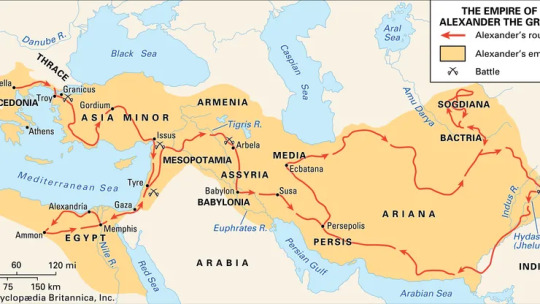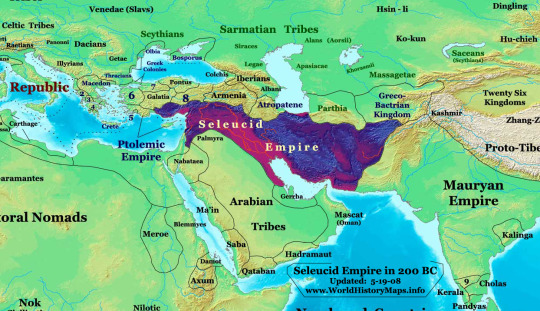#Would Alexander's empire have collapsed if he hadn't died?
Note
i have a feeling this question has been asked countless times to ATG historians, but am really curious about your perspective. you mentioned earlier that if hephaistion had not died, alexander would’ve lived. given the trajectory of their plans and attitudes toward the end of their lives, in an alternate universe where both survived together, how successful do you imagine they might’ve been at ruling their unprecedented enterprise?
i assume they passed away too young to tell for sure. but they were both very, very smart to have gotten so far at such young ages, and mistakes are bound to happen, right? i’m certain, given time and maturity, they’d have been able to more squarely wrap their minds around long-term politicking and compromise. but yeah. it’s a big question mark. curious to know your thoughts.
The answer to this question, which—as you guessed—has been considered by historians, rests largely on how any given historian evaluates the state of ATG’s empire at the time of his death.
And THAT boils down to one question: Was collapse inevitable? (Regardless of who was in charge.)
To answer that question requires some comparison.
Maps of Alexander’s empire are, inevitably, wrong, in part because they don’t show “disputed territory” and “conquered but not secured” which was true for a lot of regions from the interior of Asia Minor (which Antigonos, et al., wrestled with long after ATG was off fighting in the Persian interior) to the edges of Sogdiana and the Punjab, to the disputed borders in Armenia, to rebellious Thracian tribes.

It's one thing to win a battle. It’s another to hold a region. The Persians discovered this, as had the Neo-Assyrians and Neo-Babylonians before them. Now, so was Alexander. As would the Seleucids after him, and then Rome after that.
Alexander was a “conquering machine,” not an “empire-building machine.” He had more in common with Caesar than Augustus, and had already turned his sights on the west by the time of his death, not thinking (too) much about how to shore up what he’d just acquired. For a multinational state/empire to succeed, it needs both a “conqueror” and an “administrator.” Hephaistion was the administrator for Alexander, but he died before we get much sense of what he could actually do. For the sake of argument, let’s assume he would prove capable. He seems to have performed his military logistical and diplomatic duties with aplomb. Also, Alexander had called Antipatros to Babylon, sending Krateros back to replace him as regent in Macedonia (although I think Krateros’s real job was to prep a navy to take against Carthage). Nonetheless, rather than a “punishment” as this is often seen, a sign of ATG not trusting Antipatros, it seems, rather, a sign of great trust.
He called for the one man he was pretty damn sure could administer his empire. So yes, he was trusting Hephaistion as Chiliarch…but he was also calling in the cavalry for Hephaistion, to give him the best help possible: Antipatros.
The real problem involves the size and scope of what Alexander had conquered. The same problem (and then some) that Persia had already faced and been only moderately successful about retaining. Rome would face similar later, but they had the Mediterranean in the middle for easy sea passage. Land-based empires were intrinsically more difficult to maintain due to the simple fact of TRAVEL difficulties in that period.
These are the very pragmatic problems ATG faced. Conquering an area didn’t mean one retained the area. This goes back into the bronze age when sieges were a matter of who blinked first. But the same conflict might be fought the very next year, or year after. So when we talk about Alexander’s conquest of regions, especially border regions, we must ask how deep or secure such conquest was.
The first question we must ask, as noted above, is whether Alexander’s empire would have survived, whether or not he lived. How far into Baktria, how far into the Punjab of India would he have been able to retain control if he turned his attention west?
Maps of the Seleucid Empire typically show it extending to India and Baktria (top map, kingdom at death of Seleukos I). But that’s “at the absolute greatest extent on an optimistic day,” not reality. The Greco-Baktrian kingdom fell away by 250, and even earlier, India broke free. The Seleucids could loosely still claim the Iranian plateau down to about 150, and after the Battle of Magnesia (190/89) kicked the Seleucids out of Asia Minor, their power did slide more eastward, even though their attention remained on the Ptolemies and Rome in the west. (Second map, empire c. 200)


This is the sort of reality ATG would have had to face within his own empire. It was pretty much impossible to look east and west at once. Too much land to control.
He’d married his way into the Baktrian-Sogdian warlord system to pacify that region and his friendship with Poros gave him the SW edge of the Punjab, but he needed to understand the Persian royal house system, and he didn’t. (See Maria Brosius.) He remained an alien as King of Asia. Could he fix that? Maybe. But I’m not sure he understood the importance, or wanted to invest the time necessary. He’d rather go and conquer new land.
Ergo, I’m among those of the opinion that if he didn’t stop and invest time in consolidating what he had, he’d have lost it, probably sooner rather than later. I doubt he’d have lost it all, but he may have lost the area east of the Zagros Mountains while he was off fighting in the west.
#asks#What if Alexander had lived?#Would Alexander's empire have collapsed if he hadn't died?#Alexander the Great#Hephaistion#Hephaestion#ancient Macedonia#Seleucid empire#Hellenistic age#Classics
20 notes
·
View notes